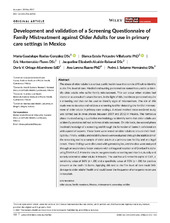| dc.contributor.author | Ruelas-González, Maria Guadalupe | en_US |
| dc.contributor.author | Pelcastre-Villafuerte, Blanca Estela | en_US |
| dc.contributor.author | Monterrubio-Flores, Eric | en_US |
| dc.contributor.author | Alcalde-Rabanal, Jacqueline Elizabeth | en_US |
| dc.contributor.author | Ortega-Altamirano, Doris Veronica | en_US |
| dc.contributor.author | Ruano, Ana Lorena | en_US |
| dc.contributor.author | Saturno Hernandez, Pedro J | en_US |
| dc.date.accessioned | 2020-06-26T08:11:29Z | |
| dc.date.available | 2020-06-26T08:11:29Z | |
| dc.date.issued | 2018 | |
| dc.Published | Ruelas-González MG, Pelcastre-Villafuerte, Monterrubio-Flores, Alcalde-Rabanal, Ortega-Altamirano DV, Ruano AL, Saturno Hernandez. Development and validation of a Screening Questionnaire of Family Mistreatment against Older Adults for use in primary care settings in Mexico. Health and Social Care in the community. 2018;26(1):102-112 | eng |
| dc.identifier.issn | 0966-0410 | |
| dc.identifier.issn | 1365-2524 | |
| dc.identifier.uri | https://hdl.handle.net/1956/23027 | |
| dc.description.abstract | The abuse of older adults is a serious public health issue that can be difficult to identify at the first level of care. Medical and nursing personnel are sometimes unable to identify older adults who suffer family mistreatment. This can occur when victims feel shame or as a result of cultural factors. In the light of this, healthcare personnel require a screening tool that can be used to identify signs of mistreatment. The aim of this study was to develop and validate a screening tool for detecting the familial mistreatment of older adults in primary care settings. A mixed method cross‐sectional study was carried out in three phases between 2009 and 2012 in Mexico. The formative phase involved using a qualitative methodology to identify terms that older adults use to identify practices defined as forms of mistreatment. On this basis, the second phase involved the design of a screening tool through the formation of items in collaboration with a panel of experts. These items were tested on older adults to ensure their intelligibility. Finally, validity and reliability levels were evaluated through the application of the screening tool to a sample of older adults at a primary care facility and at a legal centre. These findings were discussed with gerontologists, and the data were analysed through an exploratory factor analysis with orthogonal rotation and Cronbach's alpha using STATA v13. From the results, we generated a screening tool that is culturally and socially tailored to older adults in Mexico. The tool has a Cronbach's alpha of 0.89, a sensitivity value of 86% (p < .05) and a specificity value of 90% (p < .05) for positive answers to the tool's 15 items. Applying this tool at the first level of care could limit damage to older adults’ health and could lower the frequency of emergency room use in hospitals. | en_US |
| dc.language.iso | eng | eng |
| dc.publisher | Wiley | eng |
| dc.rights | Attribution CC BY | eng |
| dc.rights.uri | http://creativecommons.org/licenses/by/4.0/ | eng |
| dc.title | Development and validation of a Screening Questionnaire of Family Mistreatment against Older Adults for use in primary care settings in Mexico | en_US |
| dc.type | Peer reviewed | |
| dc.type | Journal article | |
| dc.date.updated | 2020-01-19T08:36:50Z | |
| dc.description.version | publishedVersion | en_US |
| dc.rights.holder | Copyright 2017 The Authors | |
| dc.identifier.doi | https://doi.org/10.1111/hsc.12466 | |
| dc.identifier.cristin | 1646158 | |
| dc.source.journal | Health and Social Care in the community | |

